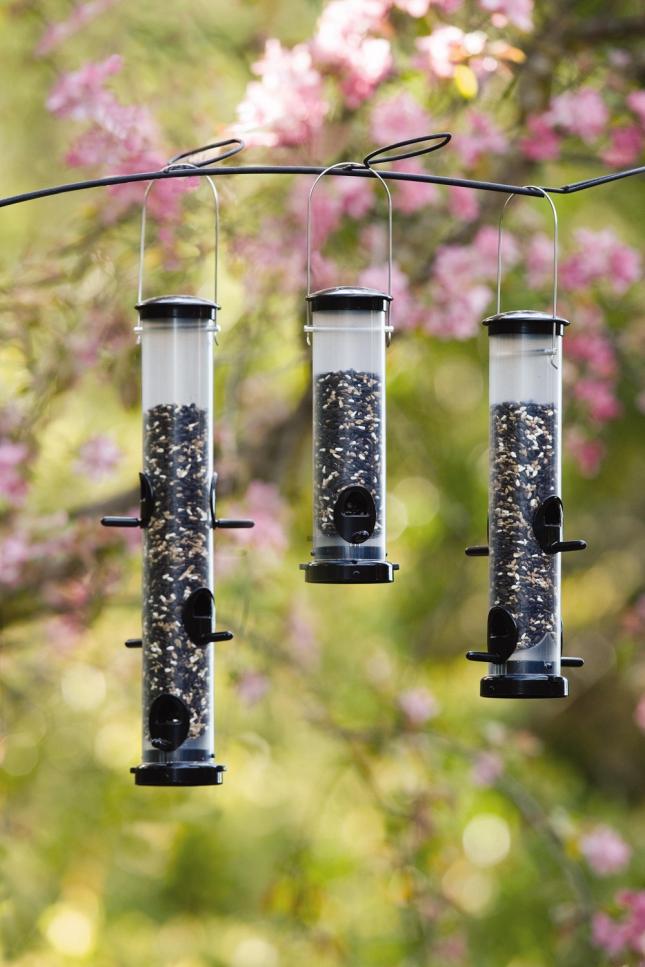Why Aren't the Birds Eating at My Feeder?
Please note that all of information provided on our website about our products is meant to be informative only. For more information regarding prices and shipping (within Canada only) please visit our store in Newmarket (16655 Yonge Street, Unit #2 Newmarket, ON), phone us (905) 868-9696 or send us an email at [email protected].
 Whether you have a new feeder or a well-established one, if the birds aren’t showing up, you may wonder why. Here are the most common reasons:
Whether you have a new feeder or a well-established one, if the birds aren’t showing up, you may wonder why. Here are the most common reasons:
1. The feeder is new or has been left empty for a while. Birds locate food purely by sight, so while birds may notice the food right away, it could also take them a while. Three-four weeks would be average for an all-purpose feeder; possibly twice that time for a specialty feeder. Being prey species, birds can be wary of new objects, so even a shiny new feeder replacing an old one may require an adjustment period.
2. Offering new foods. Birds are creatures of habit. When you switch to a new food or a different flavoured food it can take them time to adjust. For example if you have never tried offering straight safflower seeds before, birds will need to learn that it is food. This can take a while; but the good news is once they get used to it they will make the adjustment and enjoy the food. Another example would be switching from suet to no-melt dough. These foods taste slightly different, therefore an adjustment period is required. The good news is once the birds get use to your new food they will be back again and again.
3. The seed is no longer fresh. Exposed to sun and humidity, seed is good in a feeder for only 2-3 weeks. Much like we humans are reluctant to revisit a restaurant where we’ve had a bad experience, the birds will also avoid a “bad” feeder. Until the birds are eating well, place only a small amount of seed in the feeder and change it regularly so that it is still fresh when they finally discover the feeder.
4. Patience is needed in some habitats. While birds can be attracted nearly everywhere, a new feeder in woodlands will be noticed faster than one in a new subdivision or in the middle of farmland void of large trees. Ask WBU Newmarket what feeders will work best in your habitat.
5. Seed is stored improperly. As with human foods, heat and humidity will spoil seeds. Buy no more than you can use in about 8 weeks, and don’t store it in a hot shed or garage. WBU Newmarket gets a fresh shipment of seed each week, so you know your seed is fresh.
6. The feeder is dirty. A dirty feeder can harbor mold and bacterial, which is unhealthy for birds and will make new seed spoil faster. Wash feeders monthly.
7. The wrong seed or blend in being used. The wrong feeder/seed combination can result in poor results. Ask the bird feeding experts at WBU Newmarket to help you choose.
NOTE: WBU Newmarket seed blends never contain junk grains like those often found in discount store blends. Most songbirds avoid these fillers altogether. Our seed blends contain 100% edible seeds.
8. Predators! A hawk lurking around will make birds scarce. As hunting becomes more difficult, hawks tend to move on. After a few weeks, the songbirds usually return. Outdoor cats can also be an issue. Ask WBU Newmarket for additional advice.
9. Feeders are located too close together. Some feeders styles can be grouped together, while some specialty feeders, such as finch feeders, work best when 10 feet or more from other birds.
10. Natural cycles. Birds feed at feeders all year long; but activity will be highest during bad weather and during nesting season. Birds may visit less if natural sources are abundant (examples: finches love ripe coneflower seeds, and jays and woodpeckers feast on autumn acorns). Yards with little natural cover for protection may be quiet during winter winds.
11. Broken/Defective Feeders. Occasionally we see feeders in non-usable states of disrepair or ones so poorly designed they aren’t functional.
Thankfully, if one or more of these reasons apply to your feeders, the remedy is usually pretty simple and you should have birds returning soon enough. Please stop by and see us at Wild Birds Unlimited Newmarket for more detailed assistance or for a bag of fresh WBU Newmarket birdseed.


